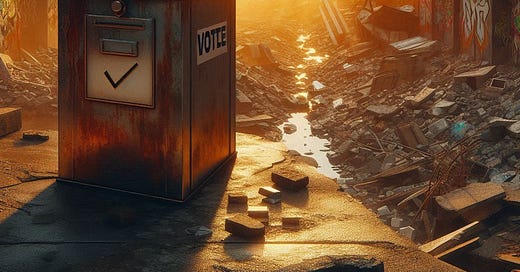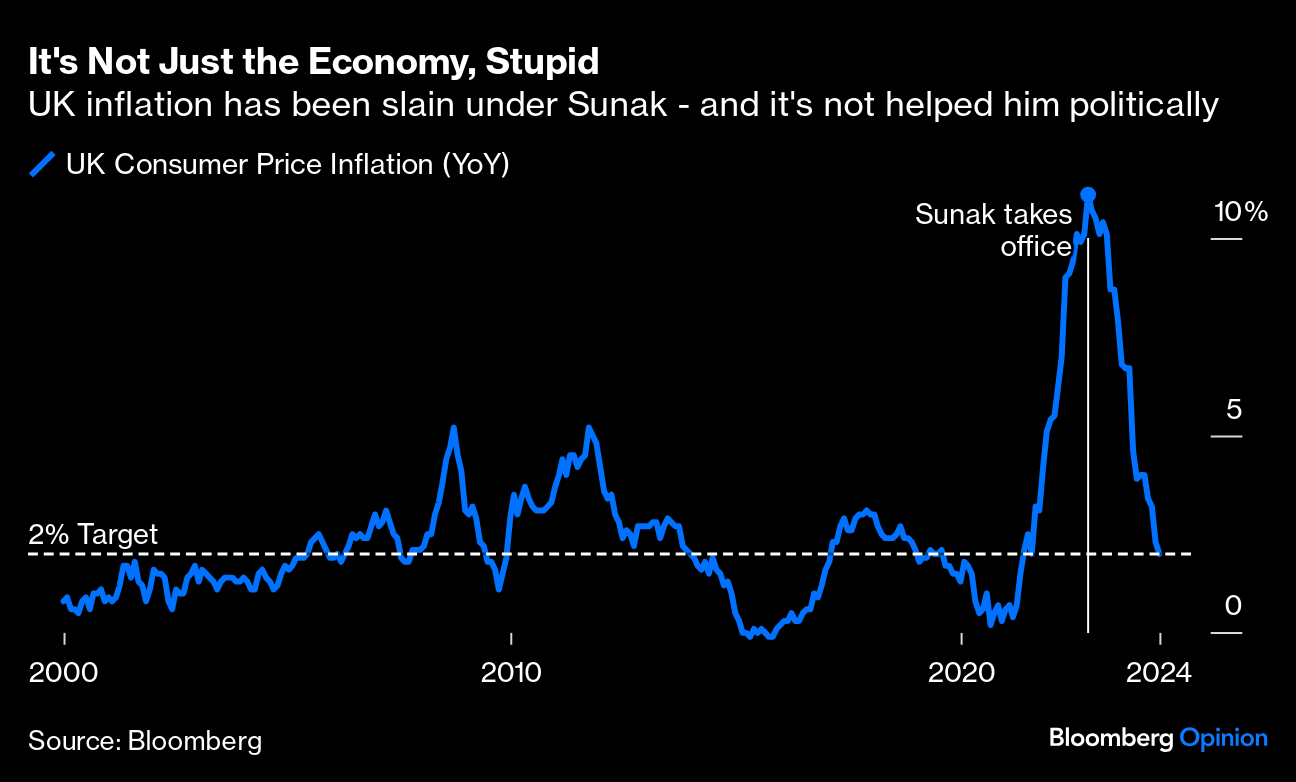Common Knowledge and the Impact of Elections
The US knife-edge may bring more change than a UK landslide. It’s time to take The Sniff Test.
Turnout and Landslides
In most elections the winning side motivates more of its supporters. This year’s US Presidential election will be determined by turnout in Mid-Western swing states.
Should Biden win Pennsylvania, Michigan and Wisconsin he is most likely re-elected. Lose one and he’s toast. Marketing dollars flood into these battlegrounds.
In contrast, landslides occur when there is a change in common knowledge. This means what everyone knows that everyone knows. When this changes there are major shifts in voting patterns. Yet super majorities don’t last.
The 2024 UK election is a landslide in waiting. Polling indicates the Conservative Party wins 40% fewer seats than their previous record low. This election in 1906 proved to be the electoral high watermark of the victorious Liberal Party.
Most elections are about the competence of the ruling party. Karl Popper’s definition of democracy as the ability to throw poor performers from office, remains the most succinct and accurate. It best explains what votes achieve.
Competence depends on record in office, unless a party can change the agenda. The Conservatives made the 2019 election about their ability to get Brexit done. Then didn’t do it.
As a result, common knowledge is that the Conservatives are incompetent. In parts of the country they are seen as duplicitous. The upcoming election will be a punishment beating rather than an embrace of Labour. This makes it different from earlier landslides and offers little insight into what the future holds.
To understand that we need common knowledge.
A 2024 Dystopia
There is a blueprint for a dystopian novel. An event must change everything. This may be a climate disaster, alien invasion, nuclear accident or a pandemic. It depends on what’s closest to the public conscious at the time.
There must also be a shadowy cabal ready to take advantage. This becomes the new elite. Religious groups, the patriarchy, capitalists and revolutionaries are all candidates. This elite introduces a series of credible but nightmarish scenarios.
In The Handmaid’s Tale, society is reshaped around procreation and women are subjected to the patriarchy. The book was published a few years after the Iranian Revolution changed the prospects for women overnight. It played on fears of a falling birth rate and Western societies being outbred. Given opposition to abortion and women’s rights, it was easy for readers to imagine this future.
The television adaptation aired from 2016. In this, low fertility is caused by environmental pollution and sexually transmitted disease. At the time, Trump’s transition from outsider to President seemed to threaten a patriarchy built around the anti-abortion rhetoric of the religious right.
We have plenty of choice for our 2024 dystopia. Another pandemic could erupt, China might invade Taiwan, or Eastern Europe fall to Russia. 171,000 American women travelled to escape abortion restrictions in their home state last year. 1,300 of the most recent Hajj pilgrims died from the heat in Saudi Arabia.
As our plot unfolds, these events trigger recessions that make record debts unpayable. Banking systems collapses, trade wars cripple supply chains and international terrorism disrupts what transportation remains. Inflation and mass unemployment stalk hand in hand, and migrants overrun Europe.
Common knowledge tells us that these things won’t happen. Politicians playing on these fears don’t win elections. Electorates rally round sensible, centrist candidates. This is Macron’s hope as France heads into the first round of voting this weekend. Starmer is a more credible centrist than Sunak in the UK.
Democrats assumed centrism would be enough for Biden but it’s not working. The dystopia of Trump II is not scaring enough people. The reason is common knowledge.
A Lasting Impact
Everyone knows that everyone knows that Donald Trump is a felon. Many fewer know why. His accusers rage about rigged elections, paying off strippers and lying. But his crimes were falsifying business records, which is a felony in New York. But it is not a big deal.
Everyone knows that Trump is a bad lad. His riches are built on borrowing, bullying and shady property deals. The court case did not change that perception. The crimes are not salacious enough to do anything other than entrench views on either side of the divide. Yet the Democrats saw reason to change tack.
Trump was portrayed as bad for women. This is a sensible strategy to undermine him in swing states. Reinforcing the creeping repeal of abortion rights is a strong hand.
But a pivot to focus on Trump as a felon fails because many believe it was a show trial. It only works as an accumulator if Trump is convicted of worse. Yet cases against him for inciting riots and stashing secrets won’t happen before November. He may pardon himself.
Meanwhile the Republicans attack Biden as senile. Videos showing the President needing physical assistance are posted around the clock. Obama guides him away and the Italian Prime Minister rescues him at the G7. This is not easy to fake.
Trump may not be in any better health, but this is not an issue. Republican attacks sting while the Democrat’s don’t. One solution is to embrace common knowledge and switch candidates but time is short. A younger candidate would shift negative sentiment back onto Trump.
It is plausible that the frailty of presidential candidates will have lasting consequences. We are in an era of executive power and unrivalled influence of experts. A failure of the next presidency could shift common knowledge. The 2030s may be a decade of more open government, legislative responsibility and consensus.
The 2024 US election would then have a more lasting impact than its UK equivalent.
Facing Final Defeat
The common knowledge in the UK is Conservative incompetence. This ad captures it and works on several levels.
The message is topical, reinforces Tory individualism and counters the charge that Labour is soft on defence. Yet it’s not by the Labour Party.
Uncommon Creative Studios circulated this as a mock up. Word spread on social media. Now it’s a real billboard by the station in London’s most marginal constituency. Politics reflects society rather than shaping it.
Landslides are a perilous shifting of sands beneath our feet. In politics they manifest social change. One election is insufficient to bring this about and the political ground continues to move. Parties adapt to the new realities and majorities fade. The Conservatives are the most successful electoral party in history because of adaptation.
Are they facing a final defeat?
Keeping it Real
To date the lowest number of seats the Conservatives have won was in 1906. The run up was marred by enough infighting that the party gave up power. Balfour handed over to the Liberal Campbell-Bannerman, who called an election and won a landslide.
While incompetence was the trigger, the election played out against a backdrop of social change. This was the age of suffragettes, politicians were as yet unpaid and reform of the Lords was coming. The run up to the First World War was overshadowed by the question of Irish home rule. Then, as now, nationalist sentiment supported the party of the left.
In 1945, the warning of socialism that Churchill sounded contrasted with the policies he’d overseen in government. Wartime was proof that politicians could deliver full employment. Therefore the failure to do so in the 1930s must have been a choice. Winning a war did not erase memories of depression.
Labour promoted Beveridge, a 1942 government report highlighting the ability to tackle want, disease, ignorance, squalor and idleness. The Conservatives circulated Hayek’s 1944 Road to Serfdom, warning of the slippery slope from temporary government programmes to totalitarianism. It would be 30 years before this latter argument resonated. Warnings of dystopia are laughed off until the threat becomes tangible.
Parties that win landslides are not setup to maintain such majorities. Weaker candidates in marginal seats know they will struggle to hold them. The opposition addresses its fault lines. This is easier when a generation of leaders is removed from parliament. The scale of the upcoming Conservative defeat may be its salvation.
Meanwhile, what if any social change is underway?
A Top Trade
A YouGov poll shows the top issues in the 2024 election are the economy and cost of living, health, and immigration. Any significant change in outcome on these issues requires a change in common knowledge. This does not look likely.
Rishi Sunak entered office promising to control inflation. He has a done a remarkable job.
The problem is that no one noticed. Charts like this inhabit a world of government officials and financial market participants weighing every policy utterance. It’s Sunak’s world of hedge fund trading and being Chancellor of the Exchequer. He made a great market call, which like all such calls, means nothing to the masses.
Economic Common Knowledge
Prime ministers don’t control inflation. The nuances of the Consumer Price Index don’t matter outside of the City. People care about the price of food, fuel and shelter.
A wet spring will leave the UK short of wheat and barley. The price of bread and beer will be higher before Christmas. Calling an election looks like Sunak closing his bet on falling inflation.
The UK imports energy. Its price is in dollars and depends on global factors. Some say it falls as green energy becomes cheaper. Others say the opposite, because supply reduces.
There is too little housing to meet demand in the UK. This means the price rises faster than inflation and pulls inflation higher. It’s the same whether you pay rent or a mortgage.
Owner occupancy in the UK is 65%. These people all vote. Building a lot more houses would cause the value of their investments to fall. No politician wants that on their watch.
Economic common knowledge is that governments control the economy. They have influence at best. With a bit of luck they look competent and get re-elected. But the policies of change, such as widespread homebuilding, are too costly and not what voters demand.
The Nation’s Health
The population is getting older, bigger and more depressed. The common knowledge is that the NHS is failing and it’s the fault of government.
A record number of people are dissatisfied with the service they receive. They believe the NHS is staffed by hardworking doctors and nurses and spoiled by layers of management and government penny-pinching. This is despite the Department of Health and Social Care spending £182 billion in 2022-23.
The trend in this chart is spoiled by a change in how the numbers are calculated. But the latest figures count. People are unhappy. 50% more people blame a poor NHS on lack of funding compared to waste. The 16% of government spending on health is going higher.
A Persistent Split
There is no common knowledge on immigration. For government, it is both inevitable and a source of labour supply for hard to fill roles. Elsewhere it depends whether you use or compete with migrant labour.
A touch over half of people say immigration numbers should be reduced. Only a third say immigration is a bad thing. Most people favour continued, selective immigration. Highly skilled workers are preferred to low skilled and a clear majority favours importing healthcare workers.
As a result, immigration will continue to be a hot topic. As long as it splits the right a Labour majority may hold. Cameron called the Brexit referendum to end party infighting. But the EU is as much symptom as cause. Immigration must be dealt with rather than controlled. It is not an EU issue and the boats still come.
More Not Change
The 2024 landslide will follow Conservative government incompetence. 1906 and 1945 were the same, the latter delayed by war. The Tories recovered and did so again after 1997, when they were brought down by sleaze. Big changes to the welfare state followed both the earlier elections, but the prevailing mood is for more not change.
A lasting response from this year’s elections is possible in the US. It will require a presidential crisis to change the balance of power between the pillars of state. The two candidates look well placed to deliver.











There's an argument that a Western economic cycle lasts about 40 years before needing a reset (not going into the minutae about cycles, super cycles and grand super cycles etc, but a discernible cycle where its clear it needs a revamp)
You can certainly make a case that the post WW2 consensus on full employment was already showing significant infaltionary strains in the early 1970s (highlighted by Kalecki in 1943) and this was made worse by the oil shock, pay claims in a model where Mark Blyth argued it became costless to move from job to job forever driving inflation higher untl 1979 when the system was reset by the Thatcher/Reagan neo liberal revolution and the path to globalism with the hegemonic USA
The zenith of the neo liberal model was arguably post the Soviet collapse and what seemed a set path to globalist expansion east into the resource rich Russian land and China to add to Africa which had long provided the European master with cheap resources.
However in the early 2000s, leverage was the problem and whilst the 2008 sub prime property collapse and the 2011 Eurozone bond market collapse made the headlines, the fact was that banks, no longer restricted by Glass Steagall etc, lent far beyond their asset base and keeled over
By 2011, Deutsche Bank's balance sheet was something like 87% of German GDP, but the official line was those naughty Greeks didn't collect their taxes and lied about their deficit, so they needed the bailout when the truth was it was German and French lenders needed rescuing otherwise the Eurozone would collapse
The concomitant problem seems to be that as the cycle moves towards its denouement, the political class weakens until a new driving force emerges from the ruins ! It was true of the post 1906 Tories from which came characters like the F E Smith and Winston Churchill It was arguably true with the 1945 Labour government It was certainly true of Thatcherism which was anything but conservative.
But it is very difficult to see a similar event happening out of the current crop of western poiiticians who stay very much on script for whichever faction they represent
This is I think what we are witnessing
Technocratic factions fighting it out for the future post the ruins of the globalist neo liberal order, evidenced by the glaring schisms in the EU as voters make a clear signal they had had enough though the structure of the EP means nothing will change in the short term, and a likely Trump win in November which I suspect will be a win for the NY banking elite who seem to have signalled they want to bring dollars back on shore and make money investing internally
What is clear though is, especially in Europe and the UK, is the people are feeling increasingly angry towards a political class with neither the desire nor the wherewithal to offer any radical vision of the future It is a governing class that openly cares little for those it is supposed to serve which is an antecedent to dangerous civil unrest